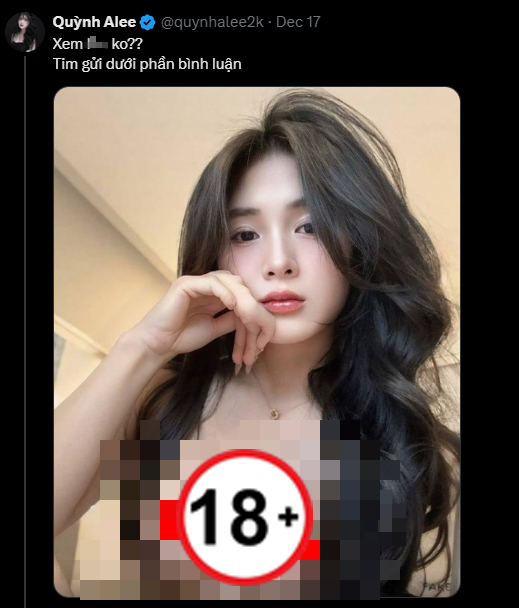As a popular TikToker with millions of followers, the girlfriend of a well-known Arena of Valor player, Quỳnh Alee is known for her captivating dance clips as well as many moments showcasing her sexy figure. Since rising to fame, her name has never shown signs of cooling down. With her beautiful appearance and natural performance style, Quỳnh Alee quickly won the hearts of the youth and became one of the top TikTokers in Vietnam.

On her personal page, the female streamer is not shy about sharing sexy, hot photos that make male fans restless. In fact, her confidence in flaunting her body is not a rare occurrence. However, recently, the online community has been buzzing over the appearance of a photo alleged to be of the female streamer Quỳnh Alee in “revealing” clothing. This photo quickly spread across forums, attracting the attention of many users.

In reality, this is a product of photo manipulation; the original image is believed to be of another girl.

However, Quỳnh Alee’s name is more well-known, so she has become a target for image and reputation exploitation. Not long ago, on social media platform X, a series of her sexy moments appeared widely with sensitive captions. There was even a photo of this hot TikToker without a shirt. The post was uploaded by an account with nearly 21 thousand followers and a verification badge. Looking at the edited images and the accompanying captions, it is easy to recognize the intent of the impersonator.

Exploiting someone else’s image, especially a celebrity like Quỳnh Alee, for likes, views, or personal gain is an unacceptable act. It not only invades privacy but also negatively impacts the reputation of the victim. In Quỳnh Alee’s case, this behavior becomes even more serious as she is continuously edited into sensitive images without her knowledge.
The online community needs to raise awareness and responsibility when sharing information. Before believing and spreading any image or information, verify its source and authenticity. Sharing unverified content not only causes misunderstandings but also enables the violation of others’ privacy.